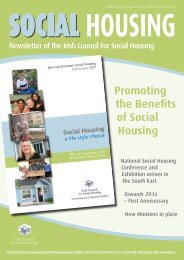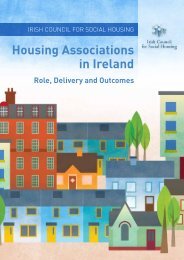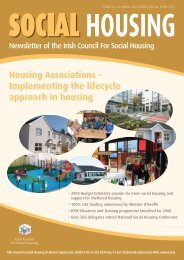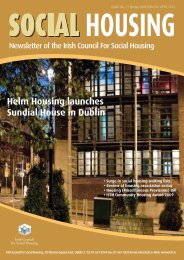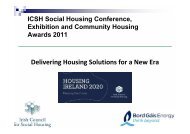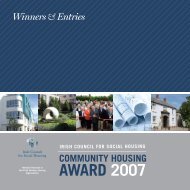National Housing Strategy for People with a Disability 2011 - 2016
National Housing Strategy for People with a Disability 2011 - 2016
National Housing Strategy for People with a Disability 2011 - 2016
Create successful ePaper yourself
Turn your PDF publications into a flip-book with our unique Google optimized e-Paper software.
community rather than in institutional settings or segregated from mainstream community.The trust of the Congregated Settings Report is <strong>for</strong> a 7 year phased closure of congregatedsettings <strong>with</strong> individuals actively supported to live full, inclusive lives at the heart of thefamily, community and society. This entails access to mainstream facilities such as housing,social, education and work <strong>with</strong> specialist support as required.Assessment and Planning Issues10.13 <strong>Housing</strong> authorities do not generally have in<strong>for</strong>mation on the number of people <strong>with</strong>an intellectual disability <strong>with</strong> a housing need. Traditionally, as people <strong>with</strong> intellectualdisabilities have lived primarily in family settings or in residential accommodation, theywould not, in general, have applied <strong>for</strong> housing services. As outlined in Chapter 6, where aperson <strong>with</strong> an intellectual disability expresses a wish to live either independently, or <strong>with</strong>appropriate supports, in the community, they are entitled to undergo an assessment ofhousing need to determine what housing services may be required. It is a matter <strong>for</strong> therelevant local authority, in line <strong>with</strong> the legislative framework and guidance provided byDECLG, to determine if the person is qualified <strong>for</strong> such support and the most appropriate<strong>for</strong>m of any such support.10.14 In the context of proposals being developed by the HSE in relation to the transitionof people <strong>with</strong> intellectual and/or physical disabilities from congregated settings tocommunity living, it is essential that the HSE work <strong>with</strong> housing authorities to develop aframework to provide guidance on the assessment of housing needs and the allocationprocess <strong>for</strong> that cohort whose support needs are capable of being met in community basedsettings. There should be a multi agency approach to identify and meet the ongoing needs<strong>for</strong> people moving from congregated settings <strong>with</strong> the HSE identified as the agency required<strong>for</strong> care and supports and the guidance being developed needs to reflect this. It is alsoimportant that the range of needs of individuals <strong>with</strong> disabilities are taken into accountwhen planning the transition process from congregated settings and the assessment andallocation process should also take account of the necessary HSE care and supports requiredby individuals. In this context, it is recommended that national guidance be developed inrelation to managing the assessment and allocation process <strong>for</strong> people transitioning fromcongregated settings on a regional or national basis.10.15 All appropriate housing options should be considered in order to meet the arisingaccommodation need. This will require the bringing together of a range of funding streamsin order to support appropriate housing solutions <strong>for</strong> those people whose support needs canbe met in community based settings.131131



